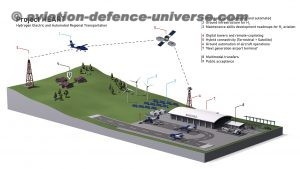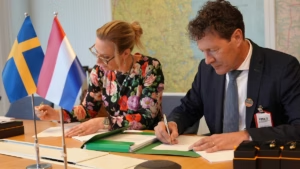- Project HEART will provide a ground-breaking integrated aviation system that will make regional travel on small aircraft greener, automated and more cost-effective

London. 28 January 2021. Inmarsat announced its participation in a ground-breaking new initiative funded by the UK Government to develop the country’s first automated, zero carbon regional air transportation network.
Project HEART (Hydrogen Electric and Automated Regional Transportation) will develop hydrogen powered, automated and remote piloting solutions for small aircraft carrying between 9 and 19 passengers, travelling ‘short hops’ of fewer than 500 nautical miles. In addition to its environmental credentials, the convenient zero-carbon travel option aims to enable scalability and lead to reductions in operating costs, door-to-door travel times and ticket prices.
Up to 100 licensed airfields throughout the UK will be made available as part of the initiative, which is expected to enter service in 2025.
Existing ‘short hop’ air travel is economically unsustainable and reliant on government subsidies to cover high maintenance and running costs. Current operations, which require two onboard pilots, depend upon expensive and polluting gas turbine powertrains.
Project HEART offers an affordable alternative that address these deficiencies with next generation technology and a ‘system-of-systems’ approach, bringing together a network of experts to re-develop the entire aviation ecosystem. As part of this approach, Inmarsat will help to power a hybrid connectivity solution that seamlessly combines its satellite communications with terrestrial networks, enabling remote ‘digital’ co-piloting and journey critical communication in the cockpit. This allows the human pilot and the digital co-pilot functions, designed by Blue Bear Systems Research, to work together effectively and operations to be managed remotely. The technology will be evaluated on Britten-Norman aircraft.
Philip Balaam, President of Inmarsat Aviation, said: “Project HEART represents a greener, smarter and more efficient future for aviation. We are proud to support this important project of the UK Government, utilising our 30 years of experience in satellite communication, navigation and surveillance for both commercial and private aviation, as well as expertise in unmanned vehicle traffic management. Working alongside our extensive network of partners, including Honeywell Aerospace, we are particularly excited about enabling remote operations for aviation networks of the future.”
Project HEART is led by the Department for Business, Energy & Industrial Strategy (BEIS) and is funded by the Industrial Strategy Challenge Fund (ISCF) Future Flight Challenge (FFC). The consortium comprises of leading UK technology companies that will contribute resources in the areas of technology, operations, infrastructure and think tank experience.
Other innovations in development for the project include hydrogen fuel cell powertrains for aircraft (led by ZeroAvia), hydrogen refuelling solutions (led by Protium), and a Mobility as a Service (MaaS) platform, with integrated sub regional flight travel mode (led by Fleetondemand), with acceptance testing headed by The Transport Research Institute of Edinburgh Napier University. In addition, architects Weston Williamson + Partners will lead on new airport infrastructure design, while the airline Loganair and Highland and Island Airports Limited will lead on accommodation of automation and hydrogen fuelled aircraft operations.



































































































































